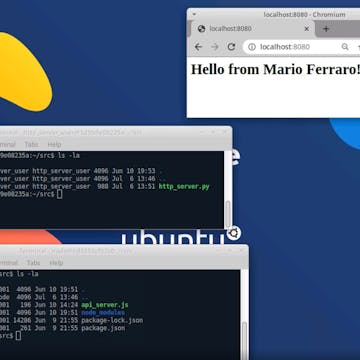
Good to know
Save this course
Reviews summary
Valuable docker development environment course
Activities
Review Linux and bash
Show steps
Refresh your knowledge of Linux and bash to strengthen your foundational understanding of the operating system and command line basics used throughout the course.
Browse courses on
Linux
Show steps
-
Review basic Linux commands
-
Practice using the bash shell
-
Configure a local development environment
Practice setting up local development environments
Show steps
Complete multiple exercises to practice setting up local development environments, solidifying your skills and building confidence in your abilities.
Show steps
-
Follow existing guides
-
Troubleshoot and resolve issues
-
Experiment with different configurations
Develop a local development environment setup guide
Show steps
Create a comprehensive guide documenting the steps for setting up a local development environment, reinforcing your understanding of the process and providing a valuable resource for future reference.
Show steps
-
Outline the required components
-
Install and configure the necessary software
-
Write detailed instructions
-
Test and refine the guide
Four other activities
Expand to see all activities and additional details
Show all seven activities
Participate in peer-to-peer code reviews
Show steps
Engage in peer-to-peer code reviews to gain feedback, improve your coding skills, and deepen your understanding of the course material.
Show steps
-
Find a peer review partner
-
Review each other's code
-
Provide constructive feedback
Develop a Docker image for your project
Show steps
Create a Docker image for your project to package your application and its dependencies, improving portability and reproducibility.
Show steps
-
Write a Dockerfile
-
Build the Docker image
-
Test the Docker image
-
Deploy the Docker image
Follow tutorials on advanced local development environment techniques
Show steps
Seek out and follow tutorials to expand your knowledge of advanced local development environment techniques, enhancing your skills and staying up-to-date with industry best practices.
Show steps
-
Identify relevant tutorials
-
Follow the instructions carefully
-
Apply the techniques in your projects
Attend a workshop on DevOps practices
Show steps
Attend a workshop to gain a deeper understanding of DevOps practices, enhancing your ability to create and maintain your local development environments effectively.
Show steps
-
Research and find a relevant workshop
-
Register for the workshop
-
Attend the workshop sessions
Review Linux and bash
Show steps
Refresh your knowledge of Linux and bash to strengthen your foundational understanding of the operating system and command line basics used throughout the course.
Browse courses on
Linux
Show steps
- Review basic Linux commands
- Practice using the bash shell
- Configure a local development environment
Practice setting up local development environments
Show steps
Complete multiple exercises to practice setting up local development environments, solidifying your skills and building confidence in your abilities.
Show steps
- Follow existing guides
- Troubleshoot and resolve issues
- Experiment with different configurations
Develop a local development environment setup guide
Show steps
Create a comprehensive guide documenting the steps for setting up a local development environment, reinforcing your understanding of the process and providing a valuable resource for future reference.
Show steps
- Outline the required components
- Install and configure the necessary software
- Write detailed instructions
- Test and refine the guide
Participate in peer-to-peer code reviews
Show steps
Engage in peer-to-peer code reviews to gain feedback, improve your coding skills, and deepen your understanding of the course material.
Show steps
- Find a peer review partner
- Review each other's code
- Provide constructive feedback
Develop a Docker image for your project
Show steps
Create a Docker image for your project to package your application and its dependencies, improving portability and reproducibility.
Show steps
- Write a Dockerfile
- Build the Docker image
- Test the Docker image
- Deploy the Docker image
Follow tutorials on advanced local development environment techniques
Show steps
Seek out and follow tutorials to expand your knowledge of advanced local development environment techniques, enhancing your skills and staying up-to-date with industry best practices.
Show steps
- Identify relevant tutorials
- Follow the instructions carefully
- Apply the techniques in your projects
Attend a workshop on DevOps practices
Show steps
Attend a workshop to gain a deeper understanding of DevOps practices, enhancing your ability to create and maintain your local development environments effectively.
Show steps
- Research and find a relevant workshop
- Register for the workshop
- Attend the workshop sessions
Career center
Docker Engineer
Software Engineer
DevOps Engineer
Site Reliability Engineer
Cloud Engineer
Full Stack Engineer
Data Engineer
Backend Engineer
Systems Administrator
Front-End Engineer
Security Engineer
Network Engineer
Cloud Architect
DevSecOps Engineer
Product Manager
Reading list
Share
Similar courses
OpenCourser helps millions of learners each year. People visit us to learn workspace skills, ace their exams, and nurture their curiosity.
Our extensive catalog contains over 50,000 courses and twice as many books. Browse by search, by topic, or even by career interests. We'll match you to the right resources quickly.
Find this site helpful? Tell a friend about us.
We're supported by our community of learners. When you purchase or subscribe to courses and programs or purchase books, we may earn a commission from our partners.
Your purchases help us maintain our catalog and keep our servers humming without ads.
Thank you for supporting OpenCourser.



